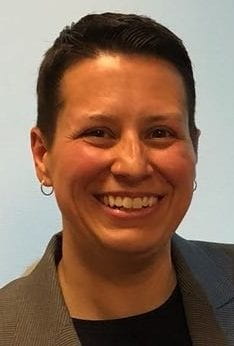Jane Tavares, PhD ‘18, always saw herself working with older people. Her Portuguese grandparents lived with her when she was growing up, so she watched them age and saw her family members pitch in with their care. Thinking she’d end up in counseling, Tavares looked for a psychology doctoral program that focused on aging, but most of them focused on children or subpopulations with specific mental health illnesses. Then she stumbled on an advertisement for UMass Boston’s gerontology doctoral program. She realized the interdisciplinary nature of gerontology meant she could take her research in any number of directions. She earned her doctorate in 2018, then joined the department, where she works now as a senior research fellow and associate lecturer.
Early in her doctoral program, Tavares was paired with Jeffrey Burr, professor of gerontology. “He asked me about my interests, and when I told him I’d done some work on social relationships and health outcomes, he jumped right on board with me,” she remembers. The Health and Retirement Study (HRS), a longitudinal study of aging in America, was just starting to collect physical data on people’s health. Tavares dived into demographic work and analyses examining social determinants of health, looking first at how volunteering affects hypertension. Later, for her dissertation, she looked at social factors around weight control in later life. She also served as managing editor of the peer-reviewed journal Research on Aging, which is edited by Burr.
“I really got into research and stats and the HRS,” she says of learning demography and more. “I had never done any kind of regression modeling. I ended up exploring so many aspects of the HRS, looking at health, social, and financial variables.”
One month after finishing her doctorate, Marc Cohen invited her to take on a post-doctoral research position with the LeadingAge LTSS Center @UMass Boston, which he co-directs. Through a long-term contract with the National Council on Aging (NCOA), Cohen and Tavares brainstorm ways to study financial and health risk among older adults—work that keeps bringing Tavares back to familiar territory with the HRS. Her recent studies have examined social inequities in the U.S. healthcare system related to person-centered care and eligibility/access to government benefit programs. She has also conducted demographic research to identify U.S. older adults who are most financially vulnerable and to explore related longitudinal predictors and risk factors for financial vulnerability in later life.
“With the NCOA, we look at people’s net wealth in the HRS for people 50 and older. We keep running that series every two years, when they update the date. Every time we find that roughly 40 percent of the population is already in a poor financial state for daily expenses, and 80 percent couldn’t absorb the cost of a major financial shock.”
“As we look at these financial risks for older adults, we see time and time again the importance of federal benefits like SNAP (a federal food assistance program) and Medicaid. But are we reaching all of the most vulnerable people, because often the qualification criteria are based on very outdated measures of poverty.”
In a third phase of research on person-centered care, being conducted for the SCAN foundation, Tavares and her colleagues are looking at applying cost figures for people who don’t engage with the healthcare system because they feel that practitioners haven’t listened to them.
“If you don’t feel listened to, chances are you’ll end up with a healthcare event that is much more costly than preventive care. Our goal is to put some figures to this, to show what [the lack of person-centered care] is costing us.”
Tavares also teaches in the online Management of Aging Services (MAS) master’s program in the gerontology department. She has revamped the program’s research methods class so that the students, most of them mid-career professionals, learn to be “good research consumers,” and to synthesize journal articles without having to learn complex research skills. She also teaches the MAS capstone course.
The combination of applied research and teaching suits Tavares. “I enjoy the teaching, and on the research end, I like that our end goal is not necessarily publishing, but trying to get our findings out there where they can make a difference.”


Leave a Reply